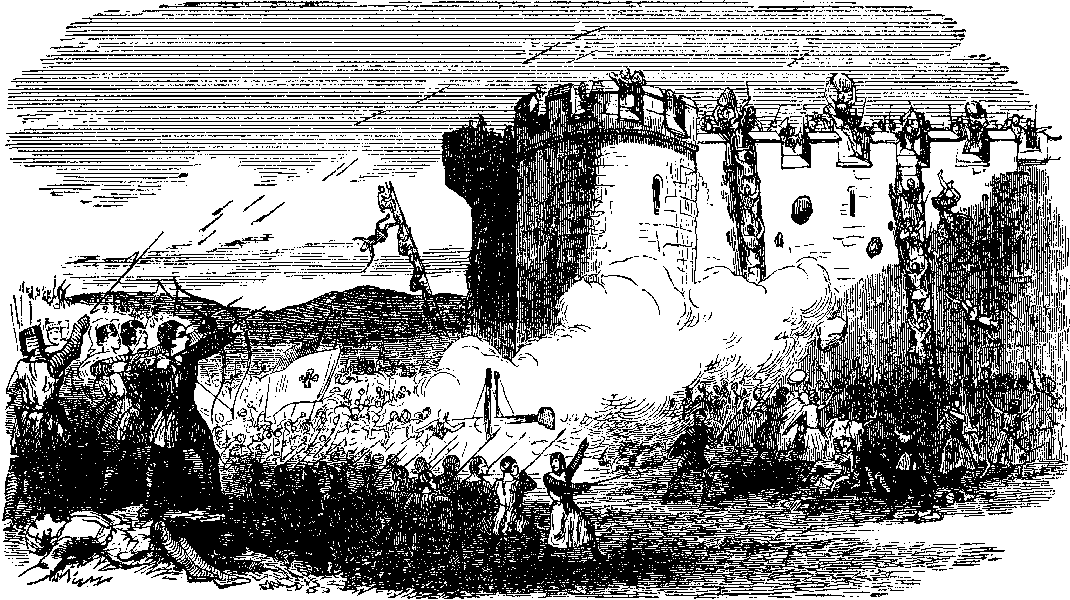Richard I - Jacob Abbott |
Difficulties
It was but a very short time after Richard had landed his forces at Acre, and had taken his position in the camp on the plain before the city, before serious difficulties began to arise between him and Philip. This, indeed, might have been easily foreseen. It was perfectly certain that, so soon as Richard should enter the camp of the Crusaders, he would immediately assume such airs of superiority, and attempt to lord it over all the other kings and princes there in so reckless and dictatorial a manner, that there could be no peace with him except in entire submission to his will.
This was, accordingly, soon found to be the case. He began to quarrel with Philip in a very short time, notwithstanding the sincere desire that Philip manifested to live on good terms with him. Of course, the knights and barons, and, after a time, the common soldiers in the two armies, took sides with their respective sovereigns. One great source of trouble was, that Richard claimed to be the feudal sovereign of Philip himself, on account of some old claims that he advanced, as Duke of Normandy, over the French kingdom. This pretension Philip, of course, would not admit, and the question gave rise to endless disputes and heartburnings.
Presently the quarrel extended to other portions of the army of the Crusaders, and the different orders of knights and bodies of soldiers espoused, some one side and some the other. The Knights Hospitalers, described in a former chapter, who had now become a numerous and very powerful force, took Richard's side. Indeed, Richard was personally popular among the knights and barons generally, on account of his prodigious strength and the many feats of reckless daring that he performed. When he went out every body flocked to see him, and the whole camp was full of the stories that were told of his wonderful exploits. He made use of the distinction which he thus acquired as a means of overshadowing Philip's influence and position. This Philip, of course, resented, and then the English said that he was envious of Richard's superiority; and they attempted to lay the whole blame of the quarrel on him, attributing the unfriendly feeling simply to what they considered his weak and ungenerous jealousy of a more successful and fortunate rival.
However this may be, the disagreement soon became so great that the two kings could no longer co-operate together in fighting against their common enemy.
Philip planned an assault against the town. He was going to take it by storm. Richard did not join him in this attempt. He made it an excuse that he was sick at the time. Indeed, he was sick not long after his arrival at Acre, but whether his illness really prevented his co-operating with Philip in the assault, or was only made use of as a pretext, is not quite certain. At any rate, Richard left Philip to make the assault alone, and the consequence was that the French troops were driven back from the walls with great loss. Richard secretly rejoiced at this discomfiture, but Philip was in a great rage.
 THE ASSAULT. |
Not long afterward Richard planned an assault, to be executed with his troops alone; for Philip now stood aloof, and refused to aid him. Richard had no objection to this; indeed, he rejoiced in an opportunity to show the world that he could succeed in accomplishing a feat of arms after Philip had attempted it and failed.
So he brought forward the engines that he had caused to be built at Messina, and set them up. He organized his assaulting columns and prepared for the attack. He made the scaling-ladders ready, and provided his men with great stores of ammunition; and when the appointed day at length arrived, he led his men on to the assault, fully confident that he was about to perform an exploit that would fill all Europe with his fame.
But, unfortunately for him, he was doomed to disappointment. His men were driven back from the walls. The engines were overthrown and broken to pieces, or set on fire by flaming javelins sent from the walls, and burned to the ground. Vast numbers of his soldiers were killed, and at length, all hope of success having disappeared, the troops were drawn off, discomfited and excessively chagrined.
The reflections which would naturally follow in the minds of Philip and Richard, as they sat in their tents moodily pondering on these failures, led them to think that it would be better for them to cease quarreling with each other, and to combine their strength against the common enemy. Indeed, their situation was now fast becoming very critical, inasmuch as every day during which the capture of the town was delayed the troops of Saladin on the mountains around them were gradually increasing in numbers, and gaining in the strength of their position, and they might at any time now be expected to come pouring down upon the plain in such force as entirely to overwhelm the whole army of the Crusaders.
So Richard and Philip made an agreement with each other that they would thenceforth live together on better terms, and endeavor to combine their strength against the common enemy, instead of wasting it in petty quarrels with each other.
From this time things went on much better in the camp of the allies, while yet there was no real or cordial friendship between Richard and Philip, or any of their respective partisans. Richard attempted secretly to entice away knights and soldiers from Philip's service by offering them more money or better rewards than Philip paid them, and Philip, when he discovered this, attempted to retaliate by endeavoring to buy off, in the same manner, some of Richard's men. In a word, the fires of the feud, though covered up and hidden, were burning away underneath as fiercely as ever.